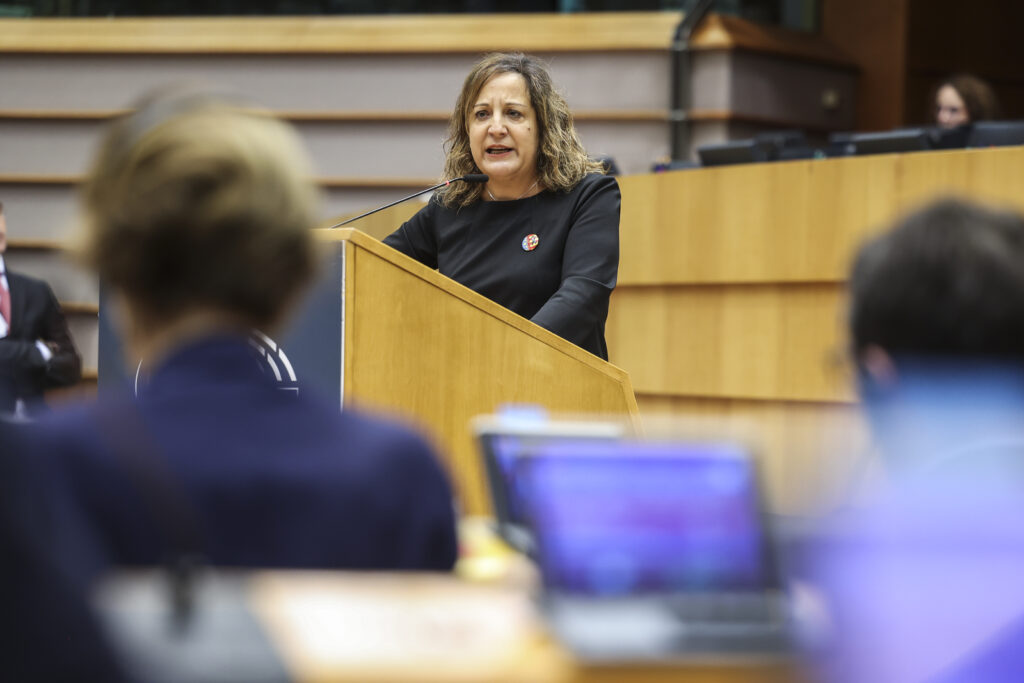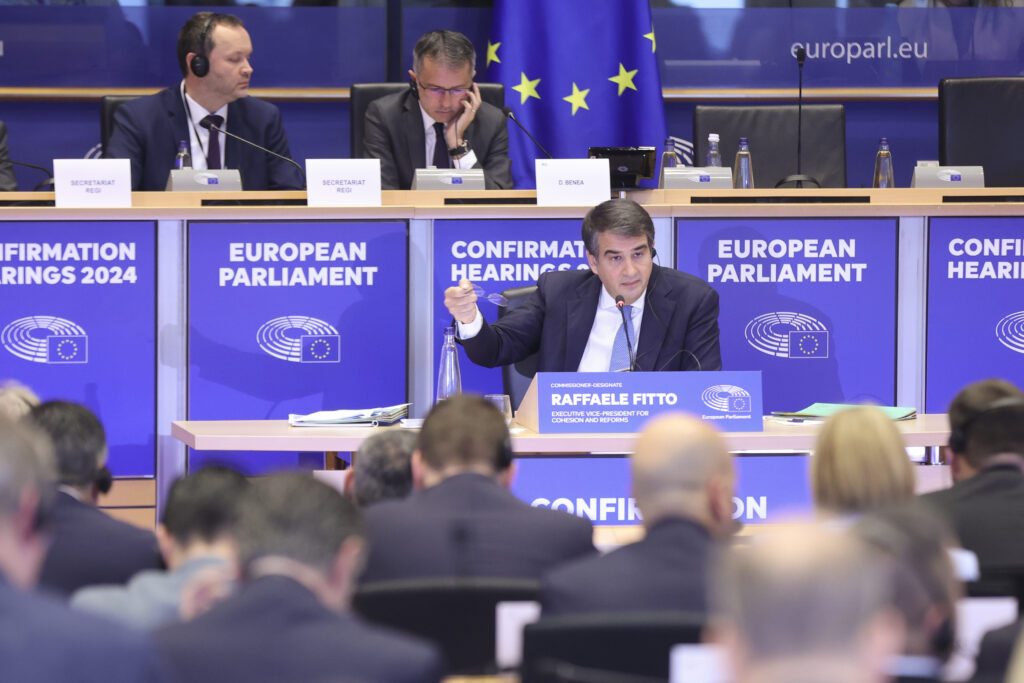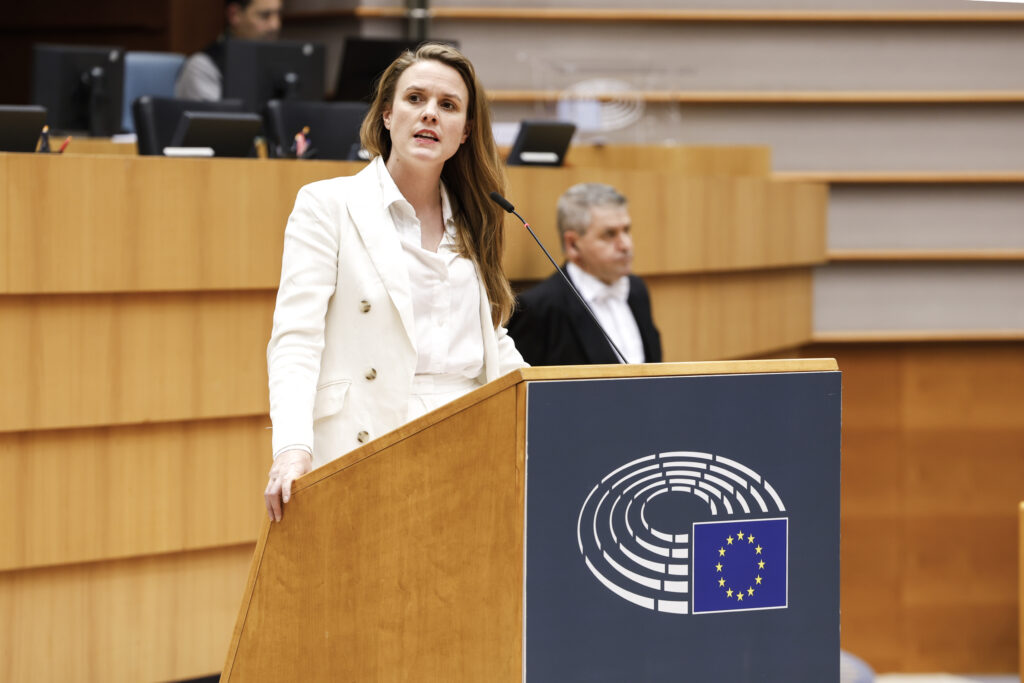Brussels – The crisis into which the Ursula 2.0 majority has plummeted deepens after the rift consummated during the parliamentary hearings of the six executive vice presidents designated for the second von der Leyen College. In the EU capital, calls and meetings between the leaders of the centrist parties that technically support the Europeanist coalition—the so-called “platform” composed of Populars (EPP), Socialists (S&D) and Liberals (Renew)—are frantically taking place to try to recompose the rift, which appears to be getting deeper and deeper between Christian Democrats and progressives. A rift focused on two profiles: those of Raffaele Fitto and Teresa Ribera. But for the moment, there is no light at the end of the tunnel.
A vanished agreement
The meeting convened today (Nov. 13) at the Berlaymont, the seat of the EU executive, by Ursula von der Leyen to try to save her majority—which has been in the grip of a political crisis of rare intensity since yesterday—ended with a stalemate. In front of the Commission chairwoman went Manfred Weber (EPP), Iratxe García Pérez (S&D) and Valérie Hayer (Renew), but according to parliamentary sources, “there was no agreement” and therefore the paralysis over the knot of vice-presidencies remains.
According to the Socialist group, “all communication channels remain open.” Still, the situation remains tense, and García Pérez herself has not declared herself “optimistic” about the outcome of the negotiations. After all, the package logic—whereby all six vice presidents should be approved together—makes negotiations complex. The Social Democrats have rallied around their candidate, Spain’s Teresa Ribera, who has come under right-wing crossfire (from the EPP to the sovereignists), calling for her head for her alleged responsibility in the tragedy in Valencia. At the same time, they insist that the Populars, especially their boss-master Manfred Weber, give up the executive vice-presidency for the Italian premier’s candidate, Giorgia Meloni.

“The leadership of the EPP has broken the political agreement of the pro-European democratic forces in the European Parliament for the sake of a destructive agenda of the Spanish Partido Popular attacking Executive Vice-President-designate Teresa Ribera,” reads a note from the Social Democratic Group. “The Spanish Partido Popular is trying to make Teresa Ribera the scapegoat for their failure to deal with the most catastrophic floods in recent European history, which claimed more than 200 lives and has effectively taken the EPP hostage, pushing the entire European Union to the brink of the abyss in the most irresponsible manner,” continues the statement, which keeps the temperature of the head-on clash between the two main political forces in the Parliament.
Commission at risk
The stakes are high: the confidence in the entire College, which is expected to be voted on by the plenary of the EU Parliament in the November or possibly December plenary. Timing at this stage is crucial and does not play in the Socialists’ favour. Next November 20, Ribera will be heard by the Madrid Parliament, before which she will have to defend herself against the Conservatives’ accusations. If the situation in Brussels does not unravel before then, it may become more difficult for the Social Democrats to defend their candidate, which would, in turn, have consequences on the inauguration of the EU executive.
It is some time since the Socialists launched their ban on Fitto, arguing that granting an apex post to a Conservative member would entail an unacceptable redefinition of the parliamentary majority that supports von der Leyen (ECR MEPs did not vote for the latter’s re-election last July). The S&D group’s line is clear: first, secure the five popular, liberal and socialist vice-presidents (Henna Virkkunen, Kaja Kallas, Stéphane Séjourné, Roxana Mînzatu, and precisely Ribera), then talk about the Melonian candidate. In the spiral of the quarrel—all within the majority—also ended the Hungarian-appointed commissioner, Olivér Várhelyi, to whom the progressives would like to cut delegations, especially on reproductive rights.

In the morning, Liberal group leader Valérie Hayer had called on her coalition partners to “get back to the table” of negotiations and “avoid a political collapse” by putting an end to their “irresponsible behaviour” by which they have “taken hostage” the entire process of approving the Commission, of which the parliamentary hearings are a key step. However, the wall between the EPP and S&D continues, with the latter having raised the barricades against what they see as an insult by the former. In the Christian Democratic house, however, Fitto’s vice presidency appears secure. At least according to Forza Italia’s head of delegation, Fulvio Martusciello, who, citing a conversation he had with Weber, assured that the minister of European Affairs “is under the umbrella of the Populars” and of Forza Italia’s Antonio Tajani.
The novelty, at this point in the story, is the personal entry of President von der Leyen, who had remained behind the scenes in managing the institutional transition between the outgoing College and the new EU executive. Since yesterday, she has been leading as a true bridge-builder to ensure that her majority does not shatter into a thousand pieces. On Tuesday afternoon, she met with the leaders of the Socialists and Liberals, who have now thrown the ball into her court, entrusting her with the thankless task of putting Weber back in line (perhaps publicly).
The reactions of other political actors
But the waters are also rough outside the official perimeter of the majority, with the Greens in a tizzy. “Relevant parts of the EPP have become totally untrustworthy and divisive,” attacked co-group leader Terry Reintke in a note, adding that for the environmentalists, too, “Commissioner Várhelyi’s portfolio must be reorganized and the executive vice-presidency must be withdrawn from Fitto.” “The pro-European democratic majority has been jeopardized by the reckless insistence of the EPP on supporting an extreme right-wing candidate who is not fit to be executive vice-president,” doubled down her counterpart Bas Eickhout.

From the opposition, on the other hand, Paolo Borchia, delegation leader of the Lega, made himself heard, denouncing “an abuse of the rules” of the Parliament by the majority forces responsible for a political “muddle” that is producing “a serious vulnus for the democratic processes of the Parliament,” as stated in a note in which the MEP announced that he had addressed a missive of protest to the president of the hemicycle Roberta Metsola. According to FdI’s leader in Strasbourg, Carlo Fidanza, who traces the Italian premier’s recent remarks, “the PD’s position on Fitto’s vice-presidency is shameful and should arouse anyone’s outrage.” “Those who row against the Italian vice-presidency row against Italy and, in order to hit Giorgia Meloni, are willing to downgrade the weight of our nation,” he added.
English version by the Translation Service of Withub






